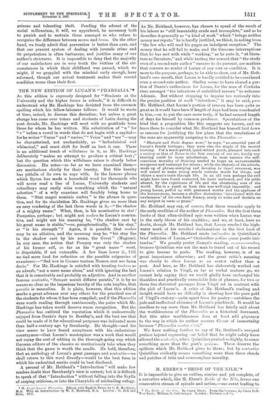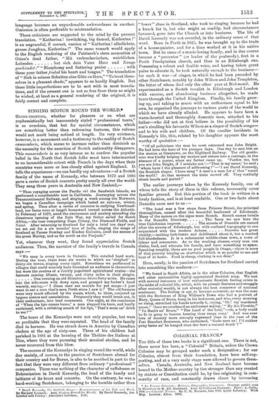M. EBERS'S " BRIDE OF THE NILE."
IT ie impossible to give an outline, concise and yet complete, of a narrative which, like M. Ebers's Bride of the Nile, forms one consecutive stream of episode and action,—one event leading to
the next and intimately connected with the preceding one. To attempt it would be as unsatisfactory as trying to pick out the principal threads of a complicated tissue in order to give an idea of the design, which, in reality, is often imperceptibly formed by the almost invisible interweaving of the smaller and more delicate threads. And it is mainly in the design—that is, the combination and connection of a long string of incidents—that the interest of M. Ebers's book lies. This, and the descriptions of Egyptian scenes and atmosphere are, in our opinion, its most interesting features. The historical accuracy and truth- fulness of description which characterise M. Ebers's works are so incontestable, that comment thereon would be super- fluous. But in order to appreciate or render justice to these qualities, the reader should possess a certain knowledge of ancient Egyptian history and life, and should have penetrated himself—so to speak—with the atmosphere of the times and surroundings described in The Bride of the Nile. Our minds are so attuned to modern conditions and modern thoughts, that to transport them to an age—which to many among us is almost mythical—in a country whose history and conditions of life have undergone such transformation, is hardly possible. It is not by reading a story of striking episode and action, however convinced we may be of its historical accuracy, that we can carry our imagination several hundreds of years back. This would, however, be easier if the human interest of M. Ebers's book were more living, more in- dividualised, more real ; for we recognise human nature through centuries that have rolled by, and in totally unfamiliar sur- roundings, when the impulses are those of a human soul, the thoughts those of a human brain. There is nothing strongly characterised or strikingly delineated in these personages who are supposed to be representative of the times and surround- ings in which they are placed—nothing that makes us feel that they are real types of a race and age we have never known. For it is a perfectly true, though apparently para. doxical fact, that a character or event which we have never met with in our own experience may be so described that we feel and know it to be true—if not to our individual experience, to some phase of human possibility. M. Ebers's characters are figures, dressed in the costumes of their time and country, moving and progressing in accordance with the pm-determined course of the narrative, not impelled by the living impulses and changing emotions which lend all the wonder and interest to a human soul. It is, however, hardly possible to pass a correct judgment upon M. Ebers's personages, for it is always on the eve or in the thick of some unusual event that they are brought before us. We see how they act in a crisis, but we have no idea of how they behave in their normal and everyday life. We should like to pause awhile and be shown the daily existence and usual conduct of the persons whose cir- cumstances and fate we find so much more interesting than their personalities. We should even welcome a trivial conversation which did not soar above domestic details and discussions, for it might help us to get a little nearer to the different individualities than when they are so constantly en scene. Each one performs his or her part creditably enough, but without lending to it anything personal. We know that Paula, the heroine, will act rightly under every circumstance, which is a little wearisome. Likewise we are convinced that her reward is awaiting her at the end of the book. That is why we are not overwhelmed with joy when, just as she is about to be sacrificed to the superstition of the populace, Fate, in the shape of a voluntary victim, interposes, and she is rescued and happily united to her lover. But in order to understand this situation, it is necessary to give some idea of the circumstances which lead to it.
The story is founded on the superstitious custom among the ancient Egyptians of sacrificing a human victim to the Nile, in the belief that this would cause it to rise. The victim selected was "the thing they deemed most noble of all the earth to show,—a pure and beautiful maiden." Through the machina- tions of her enemies, and more particularly those of Horapollo, a most vindictive old sage and star-reader, who hates the girl because she has unwittingly excited an ardent passion in the heart of Horapollo's one friend and companion—Philippus the leech—and thereby introduced a disturbing element into the existence of sympathetic companionship and peaceful study dear to the old man, Paula is chosen as the victim to be sacrificed, the "Bride of the Nile." The events are supposed to take place in the seventh century A.D., when Egypt was under the dominion of the Arabs, and the Byzantine Governor, or Mukankas, tributary to the Khaliff. The story opens with the return of Orion, the Governor's son, from Constantinople, where he has pursued and completed his studies. His natural charms and various accomplishments fit him for the part of Paula's lover. Orion's mother, however, has already selected a bride for her son in the person of Katherina, a rich little heiress, whose character is rather difficult to grasp, but who plays a very important part in the story.
The rescue of Paula at the last is the best solution of her own life and of Katherina's at the same time, for, foiled in her hopes of securing Orion's affections, after seeking every means of revenge. and thereby bringing about endless disasters—the death of her own mother amongst others—Katherina has the happy inspiration of closing her own life and the narrative with a grand coup de thecitre. Just as Paula is about to be flung into the Nile, Katherina in her barge appears, veiled in white and bedecked with flowers. She springs into the river, and the waters close over her. After this feat of self-sacrifice, everything else comes right. All the deserving personages are satisfactorily provided for, and all the undeserving ones as satisfactorily got rid of. The unpleasant old astrologer has a sufficiently strong personality to inspire us with positive satis- faction that he gets pushed into the Nile while struggling in a crowd; but we take leave of the others without much conjecture as to the duration of their happiness or concern about it.
It is with quite different feelings that we turn from the descriptive portions of M. Ebers's book. Had the author com- municated to his dramatis personce the impression of reality which characterises his descriptions of Egyptian scenes and surroundings, the book would be one of which we should retain a lasting impression. We take a few descriptive extracts at random;— "By daylight it was easier to avoid the sand-banks, but how narrow was the water-way, at this season usually overflowing! The beds of papyrus on the banks now grew partly on dry land, and their rank green had faded to straw-colour. The shifting ooze of the shore had hardened to stone, and the light west wind, which now rose and allowed of their hoisting the sail, swept donde of white duet before it. In many places the Boil was deeply fissured, and wide cracks ran across the black surface, yawning to heaven for water like thirsty throats. The water-wheels stood idle, far away from the stream, and the fields which they were wont to irrigate looked like the threshing-floors on which the crops they bore should be threshed oat. The villages and palm groves were shrouded in shimmering mist, quivering heat and dazzling light ; and the passer-by on the raised dykes of the shore bent his head as he dragged his weary feet through the deep duet."
And again:— " And just as every heart in Memphis was oppressed by such fore. bodiuge, and by the weight of a calamity which indeed no longer threatened them, but had actually come upon them, so the road, the gardens, the palms and sycamores by the roadside were covered with thick layers of dingy, choking dust. The hedges of tamarisk and shrubs looked like decaying walls of colourless, nnburnt mud bricks ; even in the high-roads the wayfarer walked in the midst of dense, white clouds raised by the feet, and if a chariot or a horseman galloped down the scorching street, fine grey sand at once filled the air, compelling the foot-passengers to shut their eyes and lips. The town was no silent, so empty, so deserted ! No one came out-of-doors unless under pressure of business or piety. Every house was a furnace, and even a bath brought no refreshment, for the water had long since ceased to be cool. A disease had also attacked the ripening dates as they hung : they dropped off in thousands from the heavy clusters under the beautiful bending crown of leaves; and now, for two days, hundreds of dead fish had been left on the banks. Even the scaly natives of the river were plague-stricken ; and the physician explained to his friend that this brought the inhabitants a fresh danger; for who could clear the shores of the dead fish ? And in such heat, how soon they would become putrid!"
There is nothing theatrical about these descriptions. They are impressions strongly, and we should say, directly received and strongly rendered. The manner in which a book should be translated is a purely relative question, which should be princi- pally determined by the greater or lesser individuality of style possessed by the writer. With certain authors, it is by finding the equivalent idea, rather than the equivalent expression, that a rendering of their writings in another language becomes at all possible. In the case of The Bride of the Nile, we should say that the difficulty of translation was that presented by the German form of expression rather than by M. Ebers's particular form of expression. In such a case, a translator should possess such a fine sense of his own language in its different shades and degrees, as will lead him to perceive at once where he is trying to force it into a channel not its own, and to feel that a turn of speech which is an allowable license or eccentricity in one
language becomes an unpardonable awkwardness in another. Omission is often preferable to mistranslation.
These criticisms are suggested to the mind by the present translation. "Katherina! bewitching, big damsel, Katherina!" is an ungraceful, if correct, version of "Katherina! allerliebste, grime jungfran, Katherina!" The same remark would apply to the English rendering of the Patriarch's stern accusation of Orion's dead father, " Mit verbrecherischen, weichlichen Lobreden hat Bich dein Vater Herz and Zunge geschiindet s" "Blasphemy and flattering praise with these your father fouled his heart and tongue." The translation of " Sich in seinem Sehatten eine Cute an thou," "To treat them- selves in a pleasant shade," appears to us hardly English. But these little imperfections are to be met with in moat transla- tions, and if the present one is not as free from them as might be wished, at least as a general rendering of the original, it is fairly correct and complete.




















































 Previous page
Previous page